Hope Training College CHCCOM005 Assessment Workbook
VerifiedAdded on 2023/06/06
|60
|8868
|339
Homework Assignment
AI Summary
This document is a learner workbook for the CHCCOM005 unit, focusing on 'Communicate and Work in Health or Community Services.' It outlines assessment instructions, including written tasks, observation, and demonstration requirements. The workbook covers topics such as active participation, plagiarism, collusion, and the assessment appeals process. It also provides details on competency outcomes, additional evidence, and confidentiality. Candidates are required to complete various activities and demonstrate their understanding of the unit's elements. The assessment includes direct observation, product-based methods, and third-party evidence. The document emphasizes the importance of adhering to assessment policies and provides guidance for candidates with special needs. Overall, the workbook serves as a comprehensive guide for students undertaking the CHCCOM005 assessment at Hope Training College.

CHCCOM0O5 COMMUNICATE AND WORK IN HEALTH OR COMMUNITY SERVICES
Page 1 of 60
DOCUMENT CODE: 107, VERSION: APRIL 2018
AUTHORISED BY CEO
ACE INSTITUTE PTY LTD T/A HOPE TRAINING COLLEGE OF AUSTRALIA (RTO 41237)
CHCCOM0O5
COMMUNICATE AND WORK IN HEALTH
OR COMMUNITY SERVICES
(Learner Workbook)
Page 1 of 60
DOCUMENT CODE: 107, VERSION: APRIL 2018
AUTHORISED BY CEO
ACE INSTITUTE PTY LTD T/A HOPE TRAINING COLLEGE OF AUSTRALIA (RTO 41237)
CHCCOM0O5
COMMUNICATE AND WORK IN HEALTH
OR COMMUNITY SERVICES
(Learner Workbook)
Paraphrase This Document
Need a fresh take? Get an instant paraphrase of this document with our AI Paraphraser

CHCCOM0O5 COMMUNICATE AND WORK IN HEALTH OR COMMUNITY SERVICES
Page 2 of 60
DOCUMENT CODE: 107, VERSION: APRIL 2018
AUTHORISED BY CEO
ACE INSTITUTE PTY LTD T/A HOPE TRAINING COLLEGE OF AUSTRALIA (RTO 41237)
Page 2 of 60
DOCUMENT CODE: 107, VERSION: APRIL 2018
AUTHORISED BY CEO
ACE INSTITUTE PTY LTD T/A HOPE TRAINING COLLEGE OF AUSTRALIA (RTO 41237)
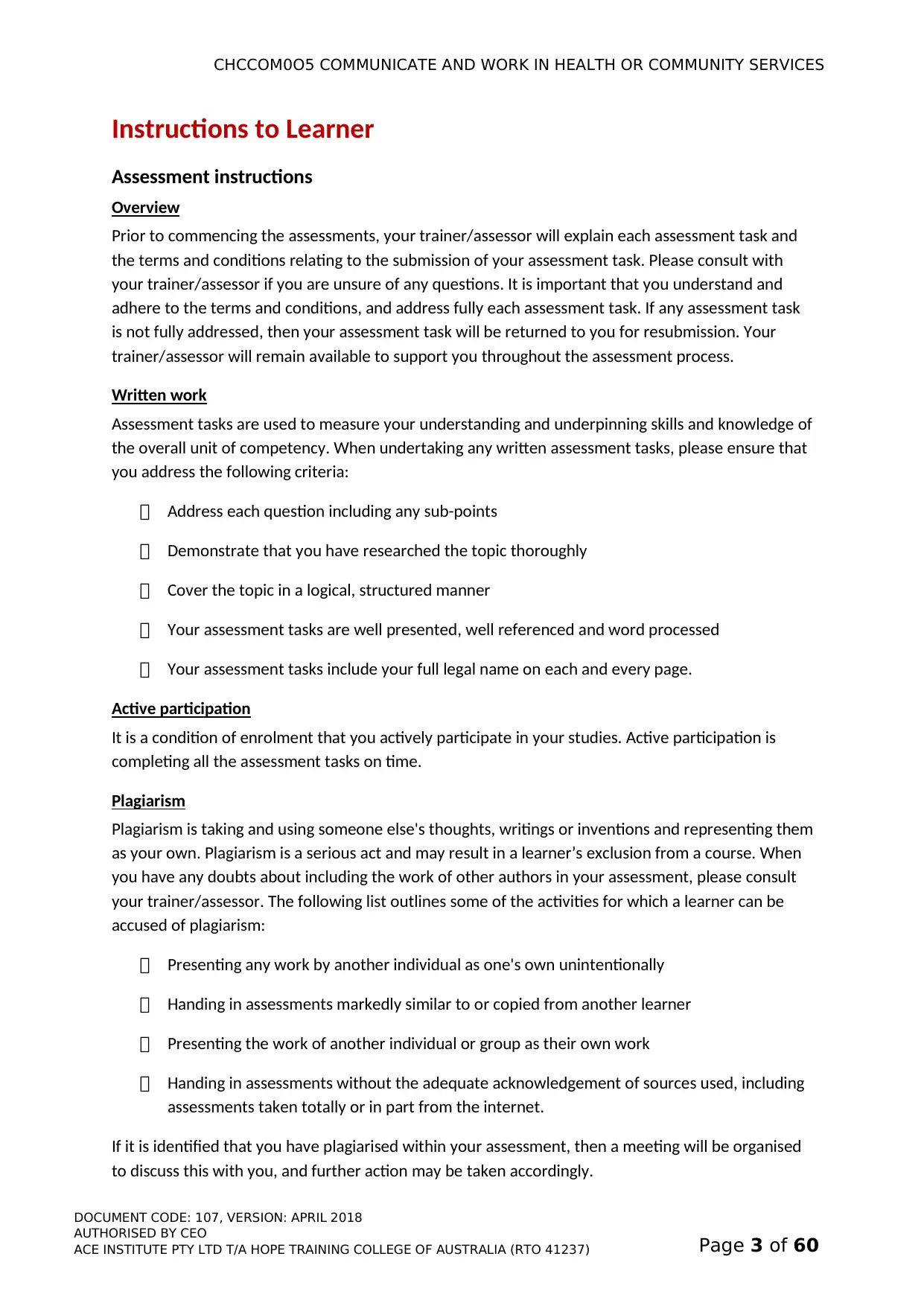
CHCCOM0O5 COMMUNICATE AND WORK IN HEALTH OR COMMUNITY SERVICES
Page 3 of 60
DOCUMENT CODE: 107, VERSION: APRIL 2018
AUTHORISED BY CEO
ACE INSTITUTE PTY LTD T/A HOPE TRAINING COLLEGE OF AUSTRALIA (RTO 41237)
Instructions to Learner
Assessment instructions
Overview
Prior to commencing the assessments, your trainer/assessor will explain each assessment task and
the terms and conditions relating to the submission of your assessment task. Please consult with
your trainer/assessor if you are unsure of any questions. It is important that you understand and
adhere to the terms and conditions, and address fully each assessment task. If any assessment task
is not fully addressed, then your assessment task will be returned to you for resubmission. Your
trainer/assessor will remain available to support you throughout the assessment process.
Written work
Assessment tasks are used to measure your understanding and underpinning skills and knowledge of
the overall unit of competency. When undertaking any written assessment tasks, please ensure that
you address the following criteria:
Address each question including any sub-points
Demonstrate that you have researched the topic thoroughly
Cover the topic in a logical, structured manner
Your assessment tasks are well presented, well referenced and word processed
Your assessment tasks include your full legal name on each and every page.
Active participation
It is a condition of enrolment that you actively participate in your studies. Active participation is
completing all the assessment tasks on time.
Plagiarism
Plagiarism is taking and using someone else's thoughts, writings or inventions and representing them
as your own. Plagiarism is a serious act and may result in a learner’s exclusion from a course. When
you have any doubts about including the work of other authors in your assessment, please consult
your trainer/assessor. The following list outlines some of the activities for which a learner can be
accused of plagiarism:
Presenting any work by another individual as one's own unintentionally
Handing in assessments markedly similar to or copied from another learner
Presenting the work of another individual or group as their own work
Handing in assessments without the adequate acknowledgement of sources used, including
assessments taken totally or in part from the internet.
If it is identified that you have plagiarised within your assessment, then a meeting will be organised
to discuss this with you, and further action may be taken accordingly.
Page 3 of 60
DOCUMENT CODE: 107, VERSION: APRIL 2018
AUTHORISED BY CEO
ACE INSTITUTE PTY LTD T/A HOPE TRAINING COLLEGE OF AUSTRALIA (RTO 41237)
Instructions to Learner
Assessment instructions
Overview
Prior to commencing the assessments, your trainer/assessor will explain each assessment task and
the terms and conditions relating to the submission of your assessment task. Please consult with
your trainer/assessor if you are unsure of any questions. It is important that you understand and
adhere to the terms and conditions, and address fully each assessment task. If any assessment task
is not fully addressed, then your assessment task will be returned to you for resubmission. Your
trainer/assessor will remain available to support you throughout the assessment process.
Written work
Assessment tasks are used to measure your understanding and underpinning skills and knowledge of
the overall unit of competency. When undertaking any written assessment tasks, please ensure that
you address the following criteria:
Address each question including any sub-points
Demonstrate that you have researched the topic thoroughly
Cover the topic in a logical, structured manner
Your assessment tasks are well presented, well referenced and word processed
Your assessment tasks include your full legal name on each and every page.
Active participation
It is a condition of enrolment that you actively participate in your studies. Active participation is
completing all the assessment tasks on time.
Plagiarism
Plagiarism is taking and using someone else's thoughts, writings or inventions and representing them
as your own. Plagiarism is a serious act and may result in a learner’s exclusion from a course. When
you have any doubts about including the work of other authors in your assessment, please consult
your trainer/assessor. The following list outlines some of the activities for which a learner can be
accused of plagiarism:
Presenting any work by another individual as one's own unintentionally
Handing in assessments markedly similar to or copied from another learner
Presenting the work of another individual or group as their own work
Handing in assessments without the adequate acknowledgement of sources used, including
assessments taken totally or in part from the internet.
If it is identified that you have plagiarised within your assessment, then a meeting will be organised
to discuss this with you, and further action may be taken accordingly.
⊘ This is a preview!⊘
Do you want full access?
Subscribe today to unlock all pages.

Trusted by 1+ million students worldwide
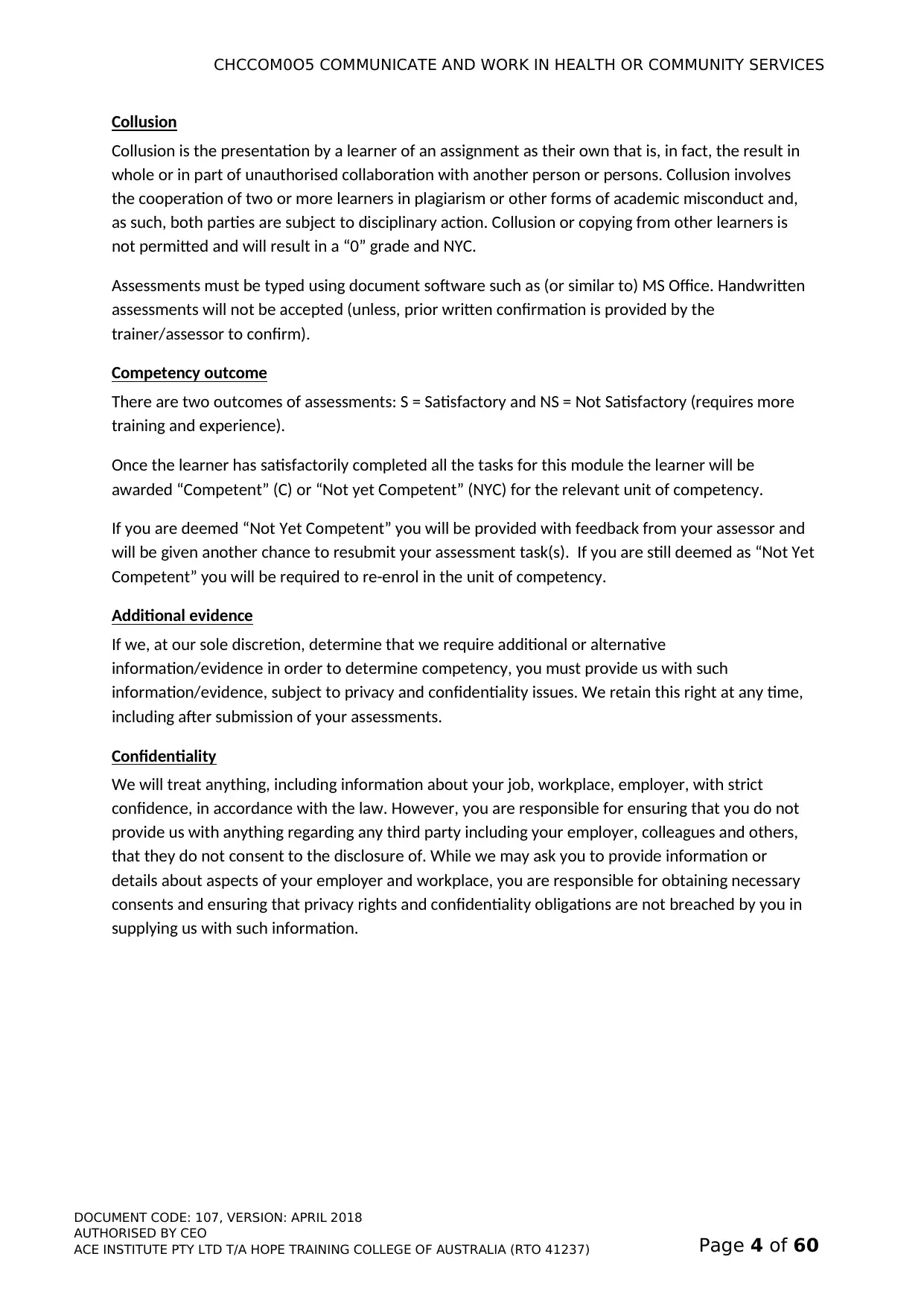
CHCCOM0O5 COMMUNICATE AND WORK IN HEALTH OR COMMUNITY SERVICES
Page 4 of 60
DOCUMENT CODE: 107, VERSION: APRIL 2018
AUTHORISED BY CEO
ACE INSTITUTE PTY LTD T/A HOPE TRAINING COLLEGE OF AUSTRALIA (RTO 41237)
Collusion
Collusion is the presentation by a learner of an assignment as their own that is, in fact, the result in
whole or in part of unauthorised collaboration with another person or persons. Collusion involves
the cooperation of two or more learners in plagiarism or other forms of academic misconduct and,
as such, both parties are subject to disciplinary action. Collusion or copying from other learners is
not permitted and will result in a “0” grade and NYC.
Assessments must be typed using document software such as (or similar to) MS Office. Handwritten
assessments will not be accepted (unless, prior written confirmation is provided by the
trainer/assessor to confirm).
Competency outcome
There are two outcomes of assessments: S = Satisfactory and NS = Not Satisfactory (requires more
training and experience).
Once the learner has satisfactorily completed all the tasks for this module the learner will be
awarded “Competent” (C) or “Not yet Competent” (NYC) for the relevant unit of competency.
If you are deemed “Not Yet Competent” you will be provided with feedback from your assessor and
will be given another chance to resubmit your assessment task(s). If you are still deemed as “Not Yet
Competent” you will be required to re-enrol in the unit of competency.
Additional evidence
If we, at our sole discretion, determine that we require additional or alternative
information/evidence in order to determine competency, you must provide us with such
information/evidence, subject to privacy and confidentiality issues. We retain this right at any time,
including after submission of your assessments.
Confidentiality
We will treat anything, including information about your job, workplace, employer, with strict
confidence, in accordance with the law. However, you are responsible for ensuring that you do not
provide us with anything regarding any third party including your employer, colleagues and others,
that they do not consent to the disclosure of. While we may ask you to provide information or
details about aspects of your employer and workplace, you are responsible for obtaining necessary
consents and ensuring that privacy rights and confidentiality obligations are not breached by you in
supplying us with such information.
Page 4 of 60
DOCUMENT CODE: 107, VERSION: APRIL 2018
AUTHORISED BY CEO
ACE INSTITUTE PTY LTD T/A HOPE TRAINING COLLEGE OF AUSTRALIA (RTO 41237)
Collusion
Collusion is the presentation by a learner of an assignment as their own that is, in fact, the result in
whole or in part of unauthorised collaboration with another person or persons. Collusion involves
the cooperation of two or more learners in plagiarism or other forms of academic misconduct and,
as such, both parties are subject to disciplinary action. Collusion or copying from other learners is
not permitted and will result in a “0” grade and NYC.
Assessments must be typed using document software such as (or similar to) MS Office. Handwritten
assessments will not be accepted (unless, prior written confirmation is provided by the
trainer/assessor to confirm).
Competency outcome
There are two outcomes of assessments: S = Satisfactory and NS = Not Satisfactory (requires more
training and experience).
Once the learner has satisfactorily completed all the tasks for this module the learner will be
awarded “Competent” (C) or “Not yet Competent” (NYC) for the relevant unit of competency.
If you are deemed “Not Yet Competent” you will be provided with feedback from your assessor and
will be given another chance to resubmit your assessment task(s). If you are still deemed as “Not Yet
Competent” you will be required to re-enrol in the unit of competency.
Additional evidence
If we, at our sole discretion, determine that we require additional or alternative
information/evidence in order to determine competency, you must provide us with such
information/evidence, subject to privacy and confidentiality issues. We retain this right at any time,
including after submission of your assessments.
Confidentiality
We will treat anything, including information about your job, workplace, employer, with strict
confidence, in accordance with the law. However, you are responsible for ensuring that you do not
provide us with anything regarding any third party including your employer, colleagues and others,
that they do not consent to the disclosure of. While we may ask you to provide information or
details about aspects of your employer and workplace, you are responsible for obtaining necessary
consents and ensuring that privacy rights and confidentiality obligations are not breached by you in
supplying us with such information.
Paraphrase This Document
Need a fresh take? Get an instant paraphrase of this document with our AI Paraphraser
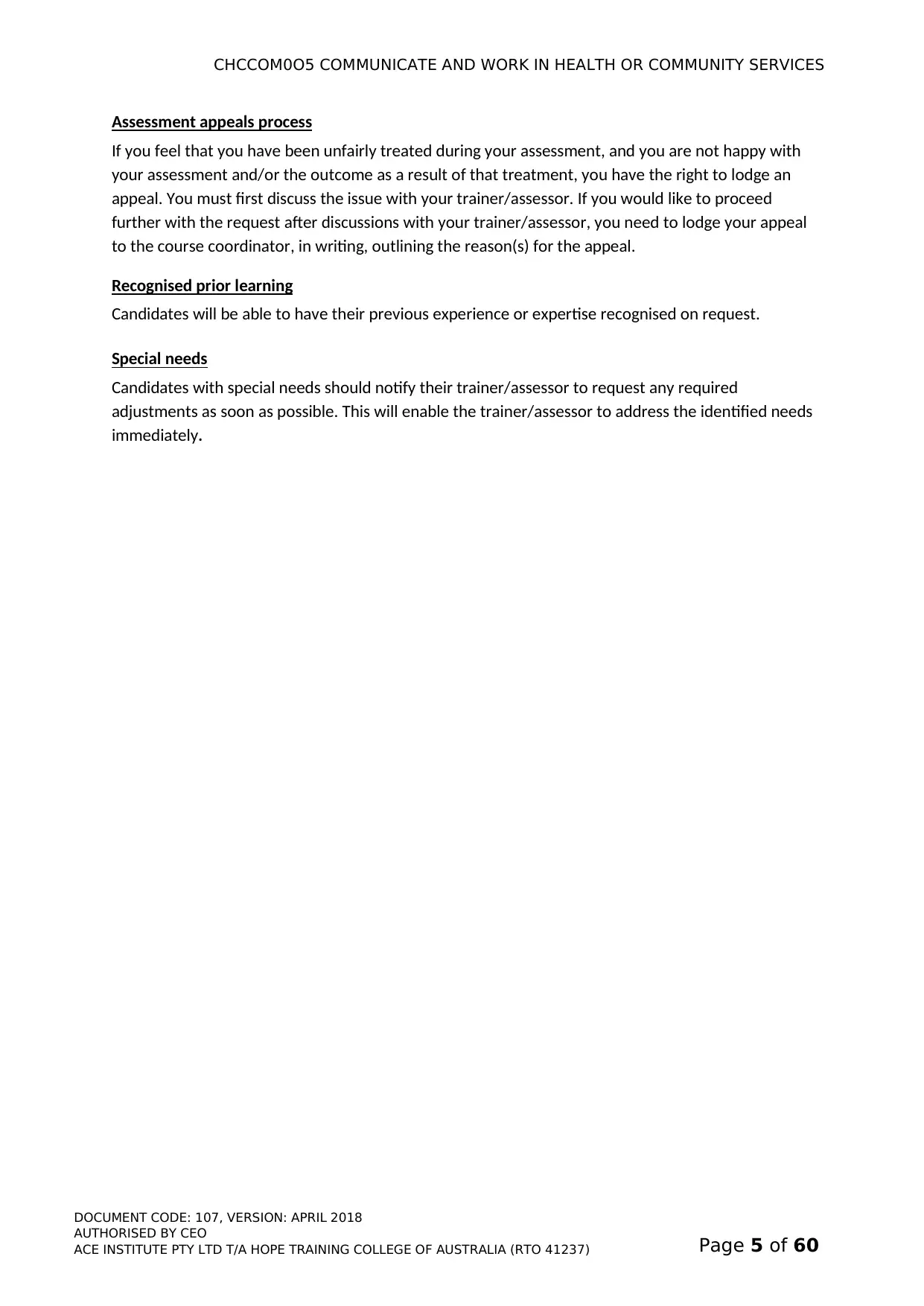
CHCCOM0O5 COMMUNICATE AND WORK IN HEALTH OR COMMUNITY SERVICES
Page 5 of 60
DOCUMENT CODE: 107, VERSION: APRIL 2018
AUTHORISED BY CEO
ACE INSTITUTE PTY LTD T/A HOPE TRAINING COLLEGE OF AUSTRALIA (RTO 41237)
Assessment appeals process
If you feel that you have been unfairly treated during your assessment, and you are not happy with
your assessment and/or the outcome as a result of that treatment, you have the right to lodge an
appeal. You must first discuss the issue with your trainer/assessor. If you would like to proceed
further with the request after discussions with your trainer/assessor, you need to lodge your appeal
to the course coordinator, in writing, outlining the reason(s) for the appeal.
Recognised prior learning
Candidates will be able to have their previous experience or expertise recognised on request.
Special needs
Candidates with special needs should notify their trainer/assessor to request any required
adjustments as soon as possible. This will enable the trainer/assessor to address the identified needs
immediately .
Page 5 of 60
DOCUMENT CODE: 107, VERSION: APRIL 2018
AUTHORISED BY CEO
ACE INSTITUTE PTY LTD T/A HOPE TRAINING COLLEGE OF AUSTRALIA (RTO 41237)
Assessment appeals process
If you feel that you have been unfairly treated during your assessment, and you are not happy with
your assessment and/or the outcome as a result of that treatment, you have the right to lodge an
appeal. You must first discuss the issue with your trainer/assessor. If you would like to proceed
further with the request after discussions with your trainer/assessor, you need to lodge your appeal
to the course coordinator, in writing, outlining the reason(s) for the appeal.
Recognised prior learning
Candidates will be able to have their previous experience or expertise recognised on request.
Special needs
Candidates with special needs should notify their trainer/assessor to request any required
adjustments as soon as possible. This will enable the trainer/assessor to address the identified needs
immediately .
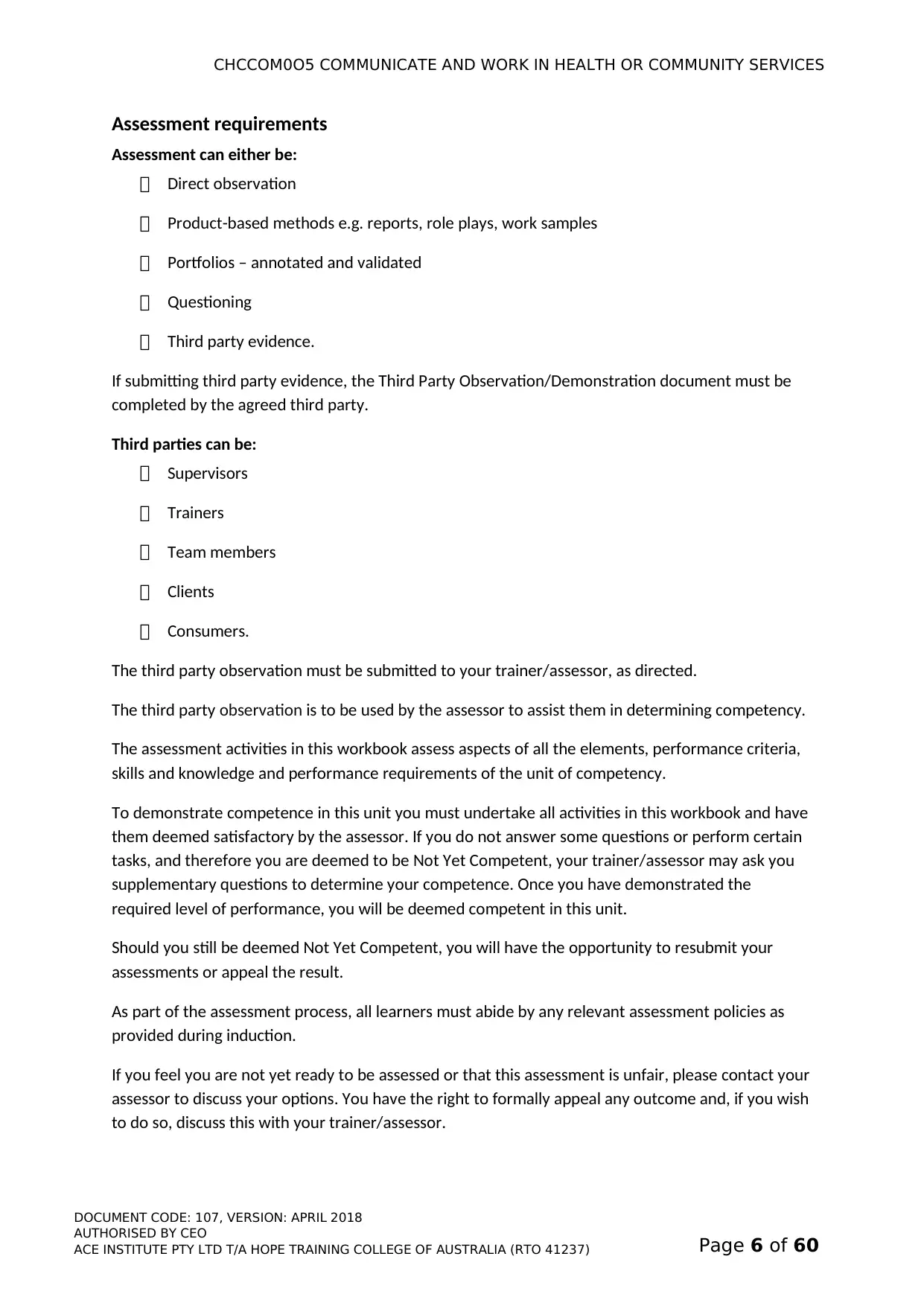
CHCCOM0O5 COMMUNICATE AND WORK IN HEALTH OR COMMUNITY SERVICES
Page 6 of 60
DOCUMENT CODE: 107, VERSION: APRIL 2018
AUTHORISED BY CEO
ACE INSTITUTE PTY LTD T/A HOPE TRAINING COLLEGE OF AUSTRALIA (RTO 41237)
Assessment requirements
Assessment can either be:
Direct observation
Product-based methods e.g. reports, role plays, work samples
Portfolios – annotated and validated
Questioning
Third party evidence.
If submitting third party evidence, the Third Party Observation/Demonstration document must be
completed by the agreed third party.
Third parties can be:
Supervisors
Trainers
Team members
Clients
Consumers.
The third party observation must be submitted to your trainer/assessor, as directed.
The third party observation is to be used by the assessor to assist them in determining competency.
The assessment activities in this workbook assess aspects of all the elements, performance criteria,
skills and knowledge and performance requirements of the unit of competency.
To demonstrate competence in this unit you must undertake all activities in this workbook and have
them deemed satisfactory by the assessor. If you do not answer some questions or perform certain
tasks, and therefore you are deemed to be Not Yet Competent, your trainer/assessor may ask you
supplementary questions to determine your competence. Once you have demonstrated the
required level of performance, you will be deemed competent in this unit.
Should you still be deemed Not Yet Competent, you will have the opportunity to resubmit your
assessments or appeal the result.
As part of the assessment process, all learners must abide by any relevant assessment policies as
provided during induction.
If you feel you are not yet ready to be assessed or that this assessment is unfair, please contact your
assessor to discuss your options. You have the right to formally appeal any outcome and, if you wish
to do so, discuss this with your trainer/assessor.
Page 6 of 60
DOCUMENT CODE: 107, VERSION: APRIL 2018
AUTHORISED BY CEO
ACE INSTITUTE PTY LTD T/A HOPE TRAINING COLLEGE OF AUSTRALIA (RTO 41237)
Assessment requirements
Assessment can either be:
Direct observation
Product-based methods e.g. reports, role plays, work samples
Portfolios – annotated and validated
Questioning
Third party evidence.
If submitting third party evidence, the Third Party Observation/Demonstration document must be
completed by the agreed third party.
Third parties can be:
Supervisors
Trainers
Team members
Clients
Consumers.
The third party observation must be submitted to your trainer/assessor, as directed.
The third party observation is to be used by the assessor to assist them in determining competency.
The assessment activities in this workbook assess aspects of all the elements, performance criteria,
skills and knowledge and performance requirements of the unit of competency.
To demonstrate competence in this unit you must undertake all activities in this workbook and have
them deemed satisfactory by the assessor. If you do not answer some questions or perform certain
tasks, and therefore you are deemed to be Not Yet Competent, your trainer/assessor may ask you
supplementary questions to determine your competence. Once you have demonstrated the
required level of performance, you will be deemed competent in this unit.
Should you still be deemed Not Yet Competent, you will have the opportunity to resubmit your
assessments or appeal the result.
As part of the assessment process, all learners must abide by any relevant assessment policies as
provided during induction.
If you feel you are not yet ready to be assessed or that this assessment is unfair, please contact your
assessor to discuss your options. You have the right to formally appeal any outcome and, if you wish
to do so, discuss this with your trainer/assessor.
⊘ This is a preview!⊘
Do you want full access?
Subscribe today to unlock all pages.

Trusted by 1+ million students worldwide
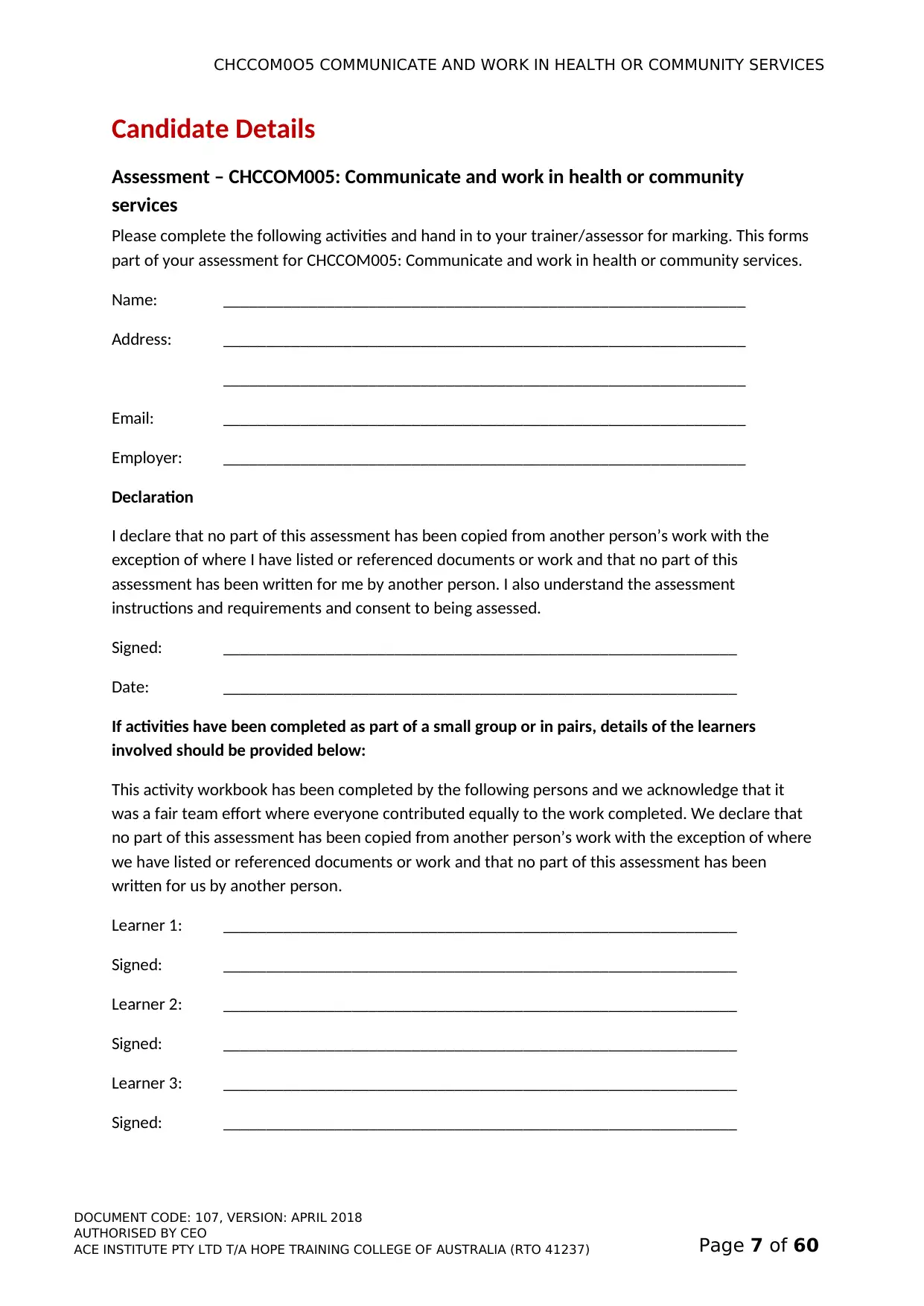
CHCCOM0O5 COMMUNICATE AND WORK IN HEALTH OR COMMUNITY SERVICES
Page 7 of 60
DOCUMENT CODE: 107, VERSION: APRIL 2018
AUTHORISED BY CEO
ACE INSTITUTE PTY LTD T/A HOPE TRAINING COLLEGE OF AUSTRALIA (RTO 41237)
Candidate Details
Assessment – CHCCOM005: Communicate and work in health or community
services
Please complete the following activities and hand in to your trainer/assessor for marking. This forms
part of your assessment for CHCCOM005: Communicate and work in health or community services.
Name: _____________________________________________________________
Address: _____________________________________________________________
_____________________________________________________________
Email: _____________________________________________________________
Employer: _____________________________________________________________
Declaration
I declare that no part of this assessment has been copied from another person’s work with the
exception of where I have listed or referenced documents or work and that no part of this
assessment has been written for me by another person. I also understand the assessment
instructions and requirements and consent to being assessed.
Signed: ____________________________________________________________
Date: ____________________________________________________________
If activities have been completed as part of a small group or in pairs, details of the learners
involved should be provided below:
This activity workbook has been completed by the following persons and we acknowledge that it
was a fair team effort where everyone contributed equally to the work completed. We declare that
no part of this assessment has been copied from another person’s work with the exception of where
we have listed or referenced documents or work and that no part of this assessment has been
written for us by another person.
Learner 1: ____________________________________________________________
Signed: ____________________________________________________________
Learner 2: ____________________________________________________________
Signed: ____________________________________________________________
Learner 3: ____________________________________________________________
Signed: ____________________________________________________________
Page 7 of 60
DOCUMENT CODE: 107, VERSION: APRIL 2018
AUTHORISED BY CEO
ACE INSTITUTE PTY LTD T/A HOPE TRAINING COLLEGE OF AUSTRALIA (RTO 41237)
Candidate Details
Assessment – CHCCOM005: Communicate and work in health or community
services
Please complete the following activities and hand in to your trainer/assessor for marking. This forms
part of your assessment for CHCCOM005: Communicate and work in health or community services.
Name: _____________________________________________________________
Address: _____________________________________________________________
_____________________________________________________________
Email: _____________________________________________________________
Employer: _____________________________________________________________
Declaration
I declare that no part of this assessment has been copied from another person’s work with the
exception of where I have listed or referenced documents or work and that no part of this
assessment has been written for me by another person. I also understand the assessment
instructions and requirements and consent to being assessed.
Signed: ____________________________________________________________
Date: ____________________________________________________________
If activities have been completed as part of a small group or in pairs, details of the learners
involved should be provided below:
This activity workbook has been completed by the following persons and we acknowledge that it
was a fair team effort where everyone contributed equally to the work completed. We declare that
no part of this assessment has been copied from another person’s work with the exception of where
we have listed or referenced documents or work and that no part of this assessment has been
written for us by another person.
Learner 1: ____________________________________________________________
Signed: ____________________________________________________________
Learner 2: ____________________________________________________________
Signed: ____________________________________________________________
Learner 3: ____________________________________________________________
Signed: ____________________________________________________________
Paraphrase This Document
Need a fresh take? Get an instant paraphrase of this document with our AI Paraphraser
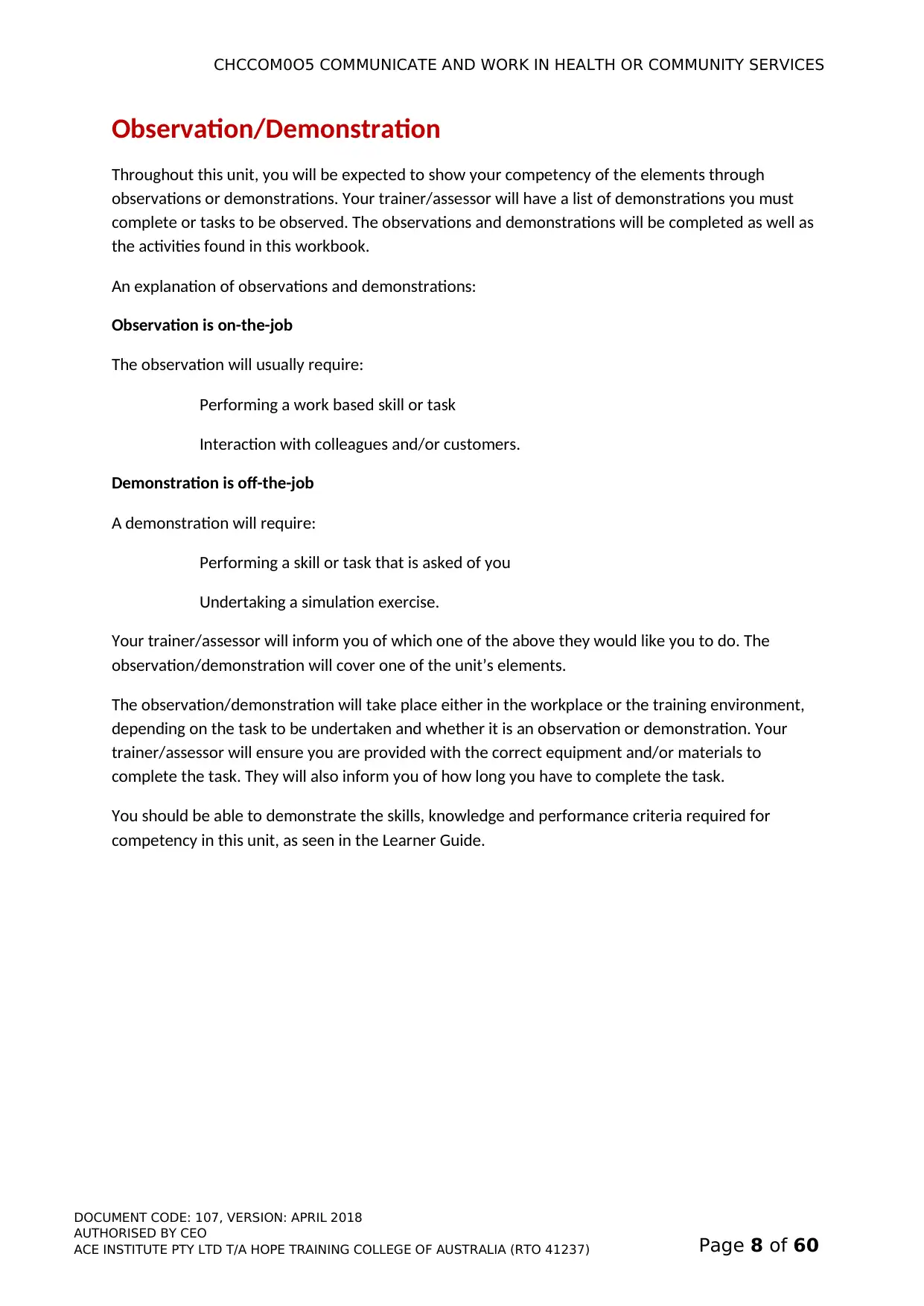
CHCCOM0O5 COMMUNICATE AND WORK IN HEALTH OR COMMUNITY SERVICES
Page 8 of 60
DOCUMENT CODE: 107, VERSION: APRIL 2018
AUTHORISED BY CEO
ACE INSTITUTE PTY LTD T/A HOPE TRAINING COLLEGE OF AUSTRALIA (RTO 41237)
Observation/Demonstration
Throughout this unit, you will be expected to show your competency of the elements through
observations or demonstrations. Your trainer/assessor will have a list of demonstrations you must
complete or tasks to be observed. The observations and demonstrations will be completed as well as
the activities found in this workbook.
An explanation of observations and demonstrations:
Observation is on-the-job
The observation will usually require:
Performing a work based skill or task
Interaction with colleagues and/or customers.
Demonstration is off-the-job
A demonstration will require:
Performing a skill or task that is asked of you
Undertaking a simulation exercise.
Your trainer/assessor will inform you of which one of the above they would like you to do. The
observation/demonstration will cover one of the unit’s elements.
The observation/demonstration will take place either in the workplace or the training environment,
depending on the task to be undertaken and whether it is an observation or demonstration. Your
trainer/assessor will ensure you are provided with the correct equipment and/or materials to
complete the task. They will also inform you of how long you have to complete the task.
You should be able to demonstrate the skills, knowledge and performance criteria required for
competency in this unit, as seen in the Learner Guide.
Page 8 of 60
DOCUMENT CODE: 107, VERSION: APRIL 2018
AUTHORISED BY CEO
ACE INSTITUTE PTY LTD T/A HOPE TRAINING COLLEGE OF AUSTRALIA (RTO 41237)
Observation/Demonstration
Throughout this unit, you will be expected to show your competency of the elements through
observations or demonstrations. Your trainer/assessor will have a list of demonstrations you must
complete or tasks to be observed. The observations and demonstrations will be completed as well as
the activities found in this workbook.
An explanation of observations and demonstrations:
Observation is on-the-job
The observation will usually require:
Performing a work based skill or task
Interaction with colleagues and/or customers.
Demonstration is off-the-job
A demonstration will require:
Performing a skill or task that is asked of you
Undertaking a simulation exercise.
Your trainer/assessor will inform you of which one of the above they would like you to do. The
observation/demonstration will cover one of the unit’s elements.
The observation/demonstration will take place either in the workplace or the training environment,
depending on the task to be undertaken and whether it is an observation or demonstration. Your
trainer/assessor will ensure you are provided with the correct equipment and/or materials to
complete the task. They will also inform you of how long you have to complete the task.
You should be able to demonstrate the skills, knowledge and performance criteria required for
competency in this unit, as seen in the Learner Guide.
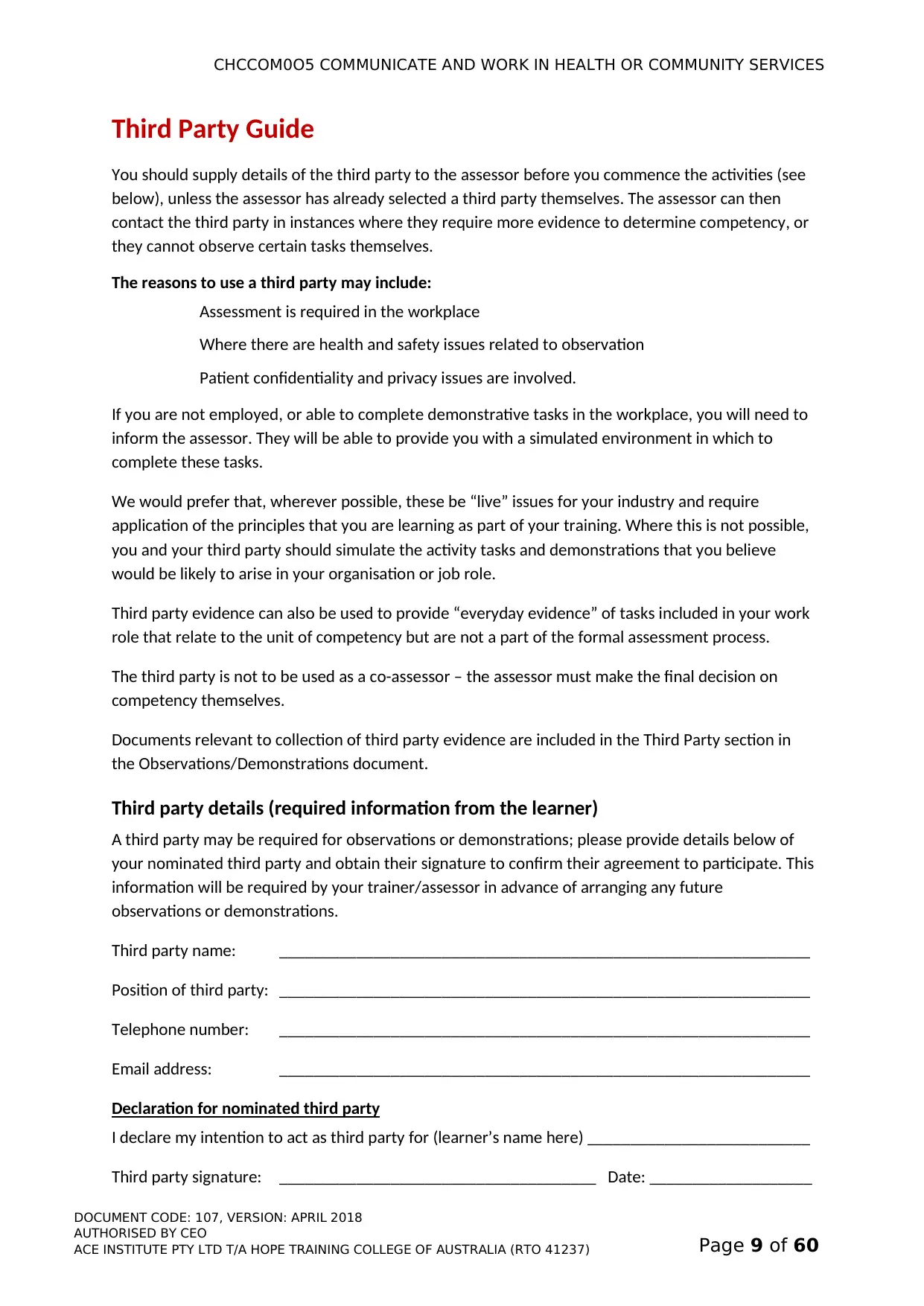
CHCCOM0O5 COMMUNICATE AND WORK IN HEALTH OR COMMUNITY SERVICES
Page 9 of 60
DOCUMENT CODE: 107, VERSION: APRIL 2018
AUTHORISED BY CEO
ACE INSTITUTE PTY LTD T/A HOPE TRAINING COLLEGE OF AUSTRALIA (RTO 41237)
Third Party Guide
You should supply details of the third party to the assessor before you commence the activities (see
below), unless the assessor has already selected a third party themselves. The assessor can then
contact the third party in instances where they require more evidence to determine competency, or
they cannot observe certain tasks themselves.
The reasons to use a third party may include:
Assessment is required in the workplace
Where there are health and safety issues related to observation
Patient confidentiality and privacy issues are involved.
If you are not employed, or able to complete demonstrative tasks in the workplace, you will need to
inform the assessor. They will be able to provide you with a simulated environment in which to
complete these tasks.
We would prefer that, wherever possible, these be “live” issues for your industry and require
application of the principles that you are learning as part of your training. Where this is not possible,
you and your third party should simulate the activity tasks and demonstrations that you believe
would be likely to arise in your organisation or job role.
Third party evidence can also be used to provide “everyday evidence” of tasks included in your work
role that relate to the unit of competency but are not a part of the formal assessment process.
The third party is not to be used as a co-assessor – the assessor must make the final decision on
competency themselves.
Documents relevant to collection of third party evidence are included in the Third Party section in
the Observations/Demonstrations document.
Third party details (required information from the learner)
A third party may be required for observations or demonstrations; please provide details below of
your nominated third party and obtain their signature to confirm their agreement to participate. This
information will be required by your trainer/assessor in advance of arranging any future
observations or demonstrations.
Third party name: ______________________________________________________________
Position of third party: ______________________________________________________________
Telephone number: ______________________________________________________________
Email address: ______________________________________________________________
Declaration for nominated third party
I declare my intention to act as third party for (learner’s name here) __________________________
Third party signature: _____________________________________ Date: ___________________
Page 9 of 60
DOCUMENT CODE: 107, VERSION: APRIL 2018
AUTHORISED BY CEO
ACE INSTITUTE PTY LTD T/A HOPE TRAINING COLLEGE OF AUSTRALIA (RTO 41237)
Third Party Guide
You should supply details of the third party to the assessor before you commence the activities (see
below), unless the assessor has already selected a third party themselves. The assessor can then
contact the third party in instances where they require more evidence to determine competency, or
they cannot observe certain tasks themselves.
The reasons to use a third party may include:
Assessment is required in the workplace
Where there are health and safety issues related to observation
Patient confidentiality and privacy issues are involved.
If you are not employed, or able to complete demonstrative tasks in the workplace, you will need to
inform the assessor. They will be able to provide you with a simulated environment in which to
complete these tasks.
We would prefer that, wherever possible, these be “live” issues for your industry and require
application of the principles that you are learning as part of your training. Where this is not possible,
you and your third party should simulate the activity tasks and demonstrations that you believe
would be likely to arise in your organisation or job role.
Third party evidence can also be used to provide “everyday evidence” of tasks included in your work
role that relate to the unit of competency but are not a part of the formal assessment process.
The third party is not to be used as a co-assessor – the assessor must make the final decision on
competency themselves.
Documents relevant to collection of third party evidence are included in the Third Party section in
the Observations/Demonstrations document.
Third party details (required information from the learner)
A third party may be required for observations or demonstrations; please provide details below of
your nominated third party and obtain their signature to confirm their agreement to participate. This
information will be required by your trainer/assessor in advance of arranging any future
observations or demonstrations.
Third party name: ______________________________________________________________
Position of third party: ______________________________________________________________
Telephone number: ______________________________________________________________
Email address: ______________________________________________________________
Declaration for nominated third party
I declare my intention to act as third party for (learner’s name here) __________________________
Third party signature: _____________________________________ Date: ___________________
⊘ This is a preview!⊘
Do you want full access?
Subscribe today to unlock all pages.

Trusted by 1+ million students worldwide
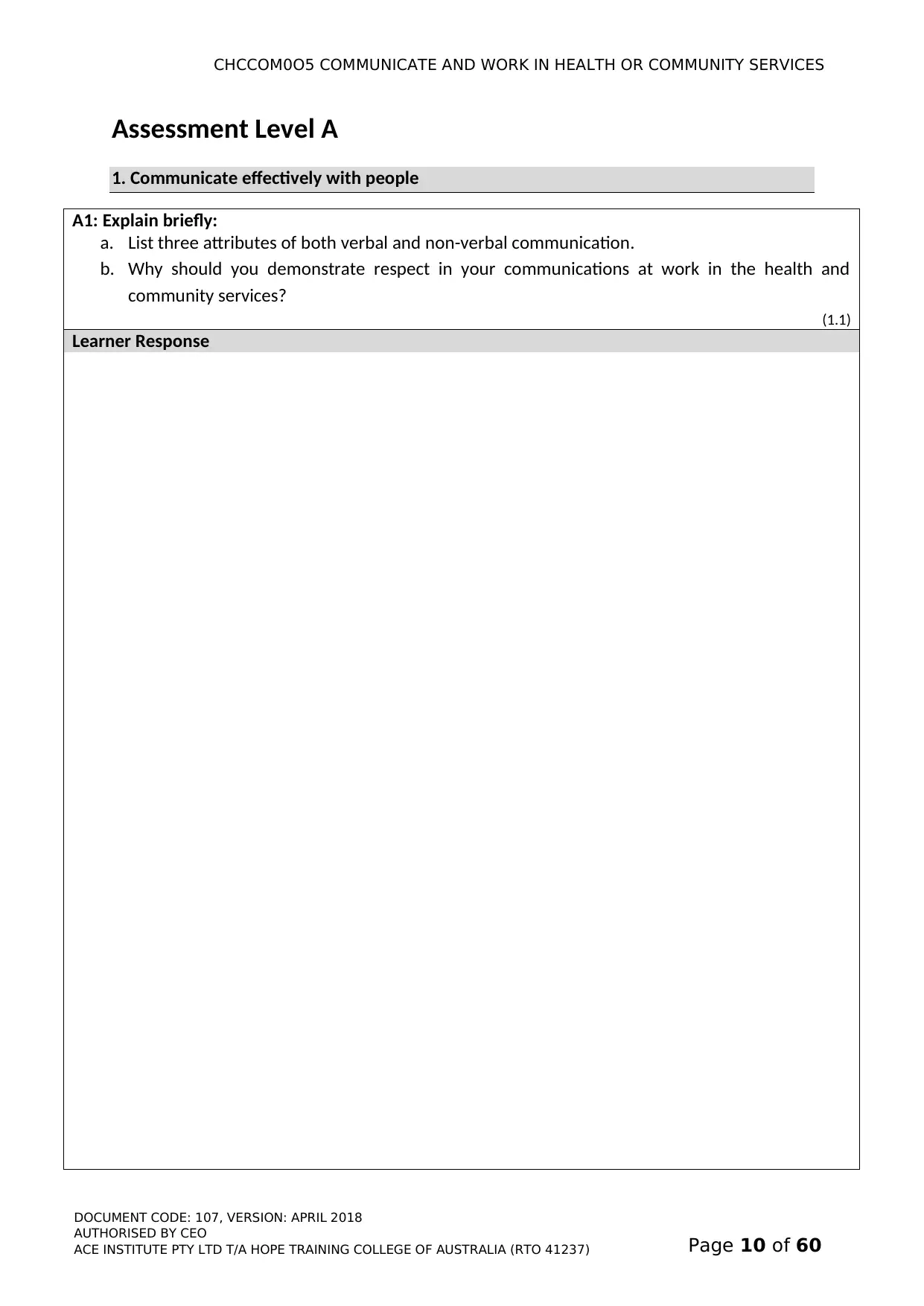
CHCCOM0O5 COMMUNICATE AND WORK IN HEALTH OR COMMUNITY SERVICES
Page 10 of 60
DOCUMENT CODE: 107, VERSION: APRIL 2018
AUTHORISED BY CEO
ACE INSTITUTE PTY LTD T/A HOPE TRAINING COLLEGE OF AUSTRALIA (RTO 41237)
Assessment Level A
1. Communicate effectively with people
A1: Explain briefly:
a. List three attributes of both verbal and non-verbal communication.
b. Why should you demonstrate respect in your communications at work in the health and
community services?
(1.1)
Learner Response
Page 10 of 60
DOCUMENT CODE: 107, VERSION: APRIL 2018
AUTHORISED BY CEO
ACE INSTITUTE PTY LTD T/A HOPE TRAINING COLLEGE OF AUSTRALIA (RTO 41237)
Assessment Level A
1. Communicate effectively with people
A1: Explain briefly:
a. List three attributes of both verbal and non-verbal communication.
b. Why should you demonstrate respect in your communications at work in the health and
community services?
(1.1)
Learner Response
Paraphrase This Document
Need a fresh take? Get an instant paraphrase of this document with our AI Paraphraser
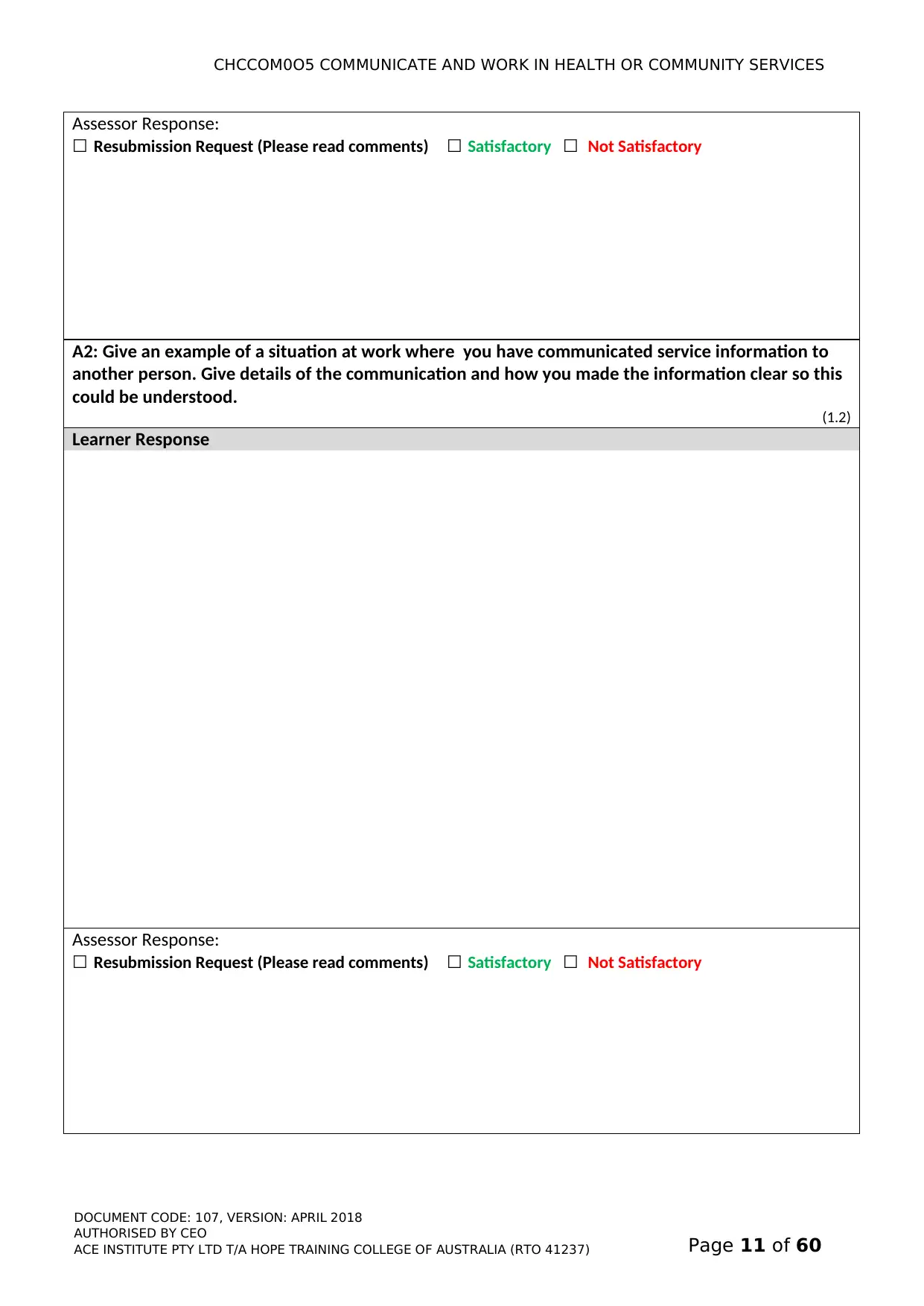
CHCCOM0O5 COMMUNICATE AND WORK IN HEALTH OR COMMUNITY SERVICES
Page 11 of 60
DOCUMENT CODE: 107, VERSION: APRIL 2018
AUTHORISED BY CEO
ACE INSTITUTE PTY LTD T/A HOPE TRAINING COLLEGE OF AUSTRALIA (RTO 41237)
Assessor Response:
☐ ☐ Satisfactory ☐ Not SatisfactoryResubmission Request (Please read comments)
A2: Give an example of a situation at work where you have communicated service information to
another person. Give details of the communication and how you made the information clear so this
could be understood.
(1.2)
Learner Response
Assessor Response:
☐ ☐ Satisfactory ☐ Not SatisfactoryResubmission Request (Please read comments)
Page 11 of 60
DOCUMENT CODE: 107, VERSION: APRIL 2018
AUTHORISED BY CEO
ACE INSTITUTE PTY LTD T/A HOPE TRAINING COLLEGE OF AUSTRALIA (RTO 41237)
Assessor Response:
☐ ☐ Satisfactory ☐ Not SatisfactoryResubmission Request (Please read comments)
A2: Give an example of a situation at work where you have communicated service information to
another person. Give details of the communication and how you made the information clear so this
could be understood.
(1.2)
Learner Response
Assessor Response:
☐ ☐ Satisfactory ☐ Not SatisfactoryResubmission Request (Please read comments)
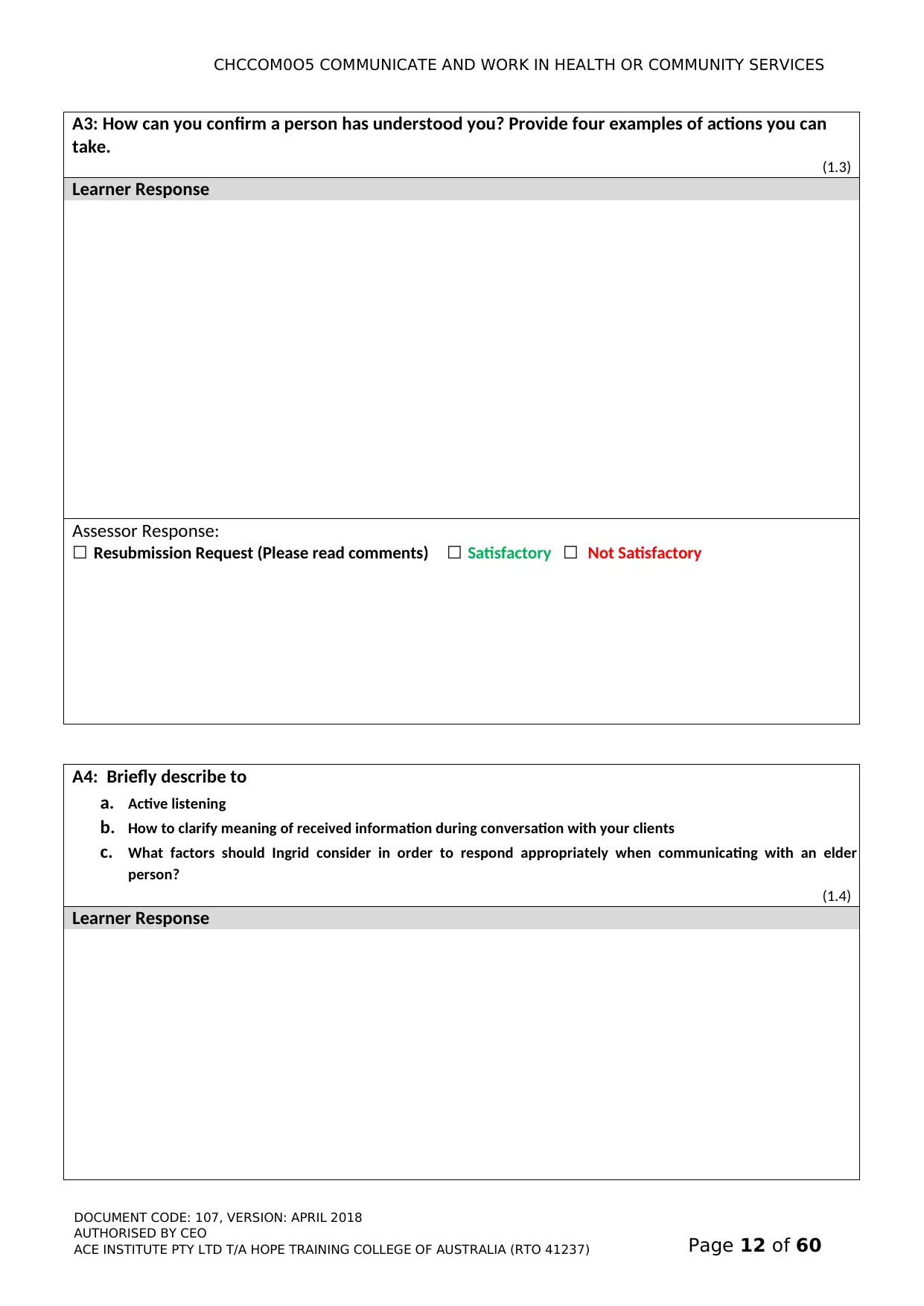
CHCCOM0O5 COMMUNICATE AND WORK IN HEALTH OR COMMUNITY SERVICES
Page 12 of 60
DOCUMENT CODE: 107, VERSION: APRIL 2018
AUTHORISED BY CEO
ACE INSTITUTE PTY LTD T/A HOPE TRAINING COLLEGE OF AUSTRALIA (RTO 41237)
A3: How can you confirm a person has understood you? Provide four examples of actions you can
take.
(1.3)
Learner Response
Assessor Response:
☐ ☐ Satisfactory ☐ Not SatisfactoryResubmission Request (Please read comments)
A4: Briefly describe to
a. Active listening
b. How to clarify meaning of received information during conversation with your clients
c. What factors should Ingrid consider in order to respond appropriately when communicating with an elder
person?
(1.4)
Learner Response
Page 12 of 60
DOCUMENT CODE: 107, VERSION: APRIL 2018
AUTHORISED BY CEO
ACE INSTITUTE PTY LTD T/A HOPE TRAINING COLLEGE OF AUSTRALIA (RTO 41237)
A3: How can you confirm a person has understood you? Provide four examples of actions you can
take.
(1.3)
Learner Response
Assessor Response:
☐ ☐ Satisfactory ☐ Not SatisfactoryResubmission Request (Please read comments)
A4: Briefly describe to
a. Active listening
b. How to clarify meaning of received information during conversation with your clients
c. What factors should Ingrid consider in order to respond appropriately when communicating with an elder
person?
(1.4)
Learner Response
⊘ This is a preview!⊘
Do you want full access?
Subscribe today to unlock all pages.

Trusted by 1+ million students worldwide
1 out of 60
Related Documents
Your All-in-One AI-Powered Toolkit for Academic Success.
+13062052269
info@desklib.com
Available 24*7 on WhatsApp / Email
![[object Object]](/_next/static/media/star-bottom.7253800d.svg)
Unlock your academic potential
Copyright © 2020–2026 A2Z Services. All Rights Reserved. Developed and managed by ZUCOL.




